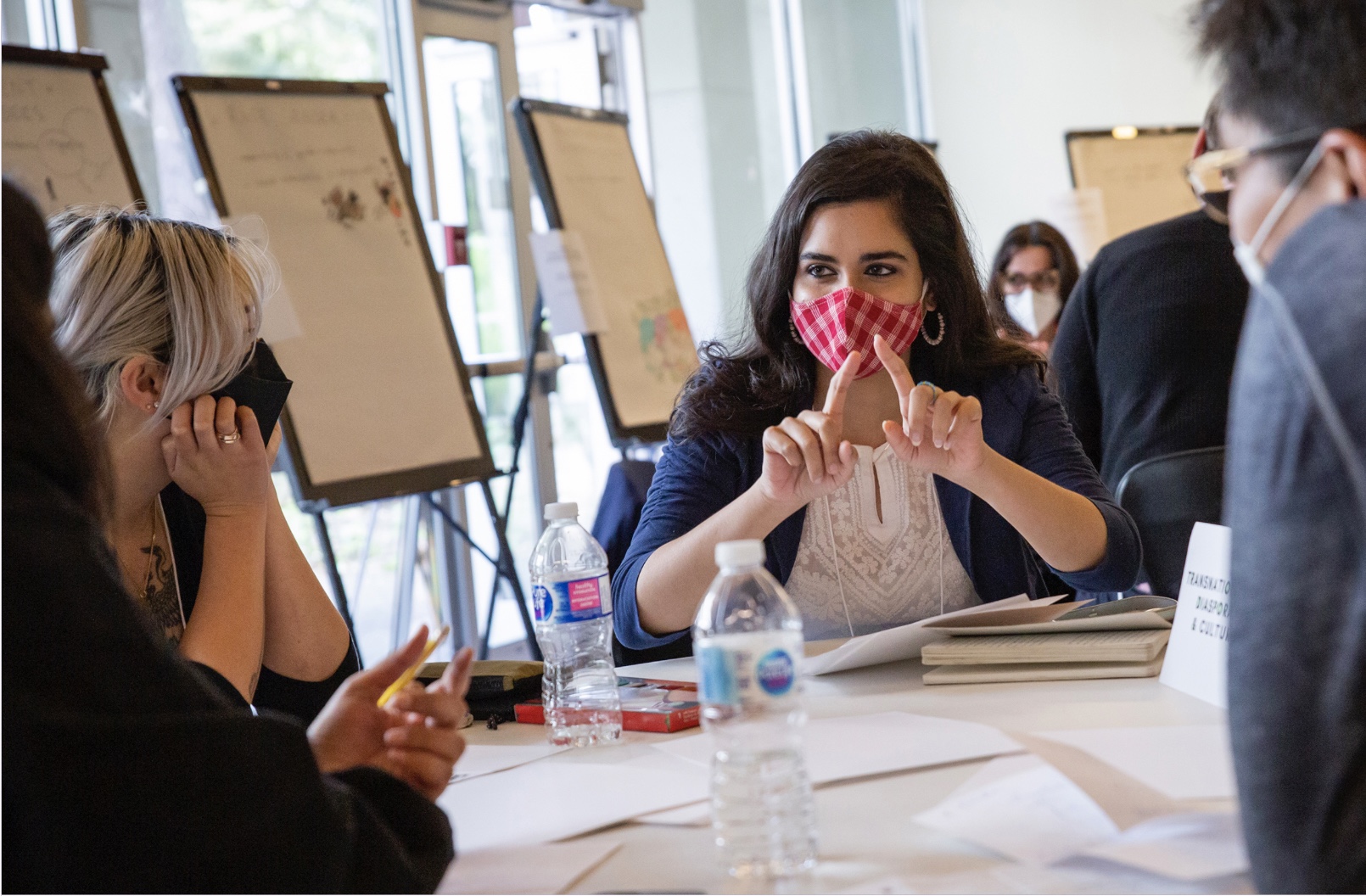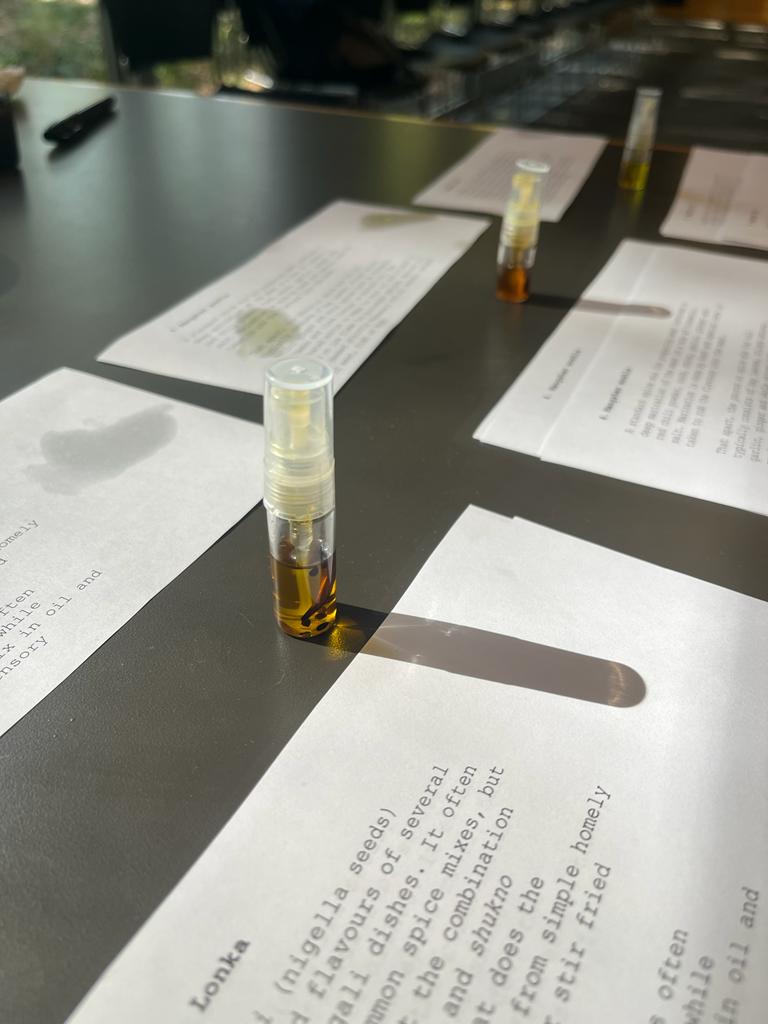Mahashewta Bhattacharya
Being a Public Scholar means acknowledging the diversities inherent in the category ‘public’ and being equipped to talk across social, cultural, economic and ideological differences that set them apart. It demands transcending academia's confines to think creatively, fostering dialogue, and leaving a meaningful impact on challenges commonly faced. Being a Public Scholar is about co-creating multimodal knowledges with the public, involving them in the research process, and valuing their lived experiences. It's a commitment to openness, transparency, and collaboration.
Research description
My doctoral research with women rural to urban migrants in Eastern India who are employed as domestic workers in the city and looks at how their lifeworlds are directly impacted by the intersectional forces of mobility, gender expectations, poverty and cultural ideas of sensory aesthetics. My work is located at the intersections of material culture, sensorium and gender in postcolonial anthropology, and tries to read the practices of making home as an autobiographical project among women conventionally left outside of the historiographic project. One, this approach of focusing on the homebuilding craft studies the symbolic universe of the animate – inanimate interactions to recognise mundane everyday practice as an empirical entry-point to study motivations, apprehensions, and aspirations in mobility. Two, it lays bare the routine and mundane forms of exclusion that define class relationships in India. Three, it allows us to think critically about the subaltern articulations of and negotiations with the ideas of the space, ownership and belonging through a creative reimagination of private space and strategic use of public space. This tripartite approach allows me to take a classic feminist anthropological stance, and see gender not as a subsidiary but a primary variable in social life.
What does being a Public Scholar mean?
Being a Public Scholar first and foremost means acknowledging the diversities inherent in the category ‘public’ and being equipped to talk across social, cultural, economic and ideological differences that set them apart. It demands transcending academia's confines to think creatively, fostering dialogue, and leaving a meaningful impact on challenges commonly faced. Being a Public Scholar is not just about disseminating knowledge; it's about co-creating multimodal knowledges with the public, involving them in the research process, and valuing their lived experiences. It's a commitment to openness, transparency, and collaboration. As a scholar, teaching assistant, writing consultant and content writer, I have always perched comfortably at the intersection of academia and the public. Having worked with some of the most creative and critical artists in India, I had been shaped into thinking multimodally, creatively and sensitively from the very onset. My proposed exhibition for the PSI project, based on hybrid methods, to be curated in collaboration with dancer and arts manager Paramita Saha, is most representative of that interface. A tenet that I learnt from her that rings loud in my proposed project is that “arts practice forces us to think of experiences that other people will have.” That itself launches me away from the echo chambers of academia and compels me to embrace modes of thinking collectively with the public.
In what ways do you think the PhD experience can be re-imagined with this Initiative?
I see the PSI being both a crucial ally and a launchpad in the entire PhD experience we curate for ourselves here at UBC. Not only does it equip students from different cultural and educational backgrounds with the most updated resource toolkits and skillsets to think with, it also amplifies our research outputs in ways that they reach a wider audience in ways that conventional academic settings often fall short. Through the active encouragement of collaborative community research, it bridges the long-existent wide gaps in academia between theory and practise and compels us scholars to think more proactively of our research in practical and practicable terms that can benefit communities. Building networks of scholars across the different departments at UBC, it helps us develop cognisance of parallel works in other disciplines, thus fostering possibilities of interdisciplinary thinking and collaborations.
How do you envision connecting your PhD work with broader career possibilities?
My deep commitment to academia is represented in the nine years of my life that I have already dedicated to it, only to continue being in love with it every single day. My commitment is rooted in the many thrills of discovering through research and being able to tell stories of communities in ways that matter to them. My visions for this long but exciting journey are two-fold. First, I aim to develop expertise in my research field by producing innovative and impactful research methods that help dismantle the elitist discourses prevalent in anthropology and incorporate more alternate sensory literacies to write and read subaltern ways of being. This will provide a solid foundation and help me establish a niche for myself in academia, where I can contribute to knowledge advancement and inspire future generations of scholars. In addition to contributing to academia and professional spheres, I am deeply committed to giving back to the communities I have worked with and the academic spaces that have nurtured my growth. This entails actively engaging in initiatives that promote knowledge-sharing, mentorship, and collaboration, aimed at enriching both local and global communities, as well as fostering academic environments that are inclusive, supportive, and conducive to learning and innovation. I owe my allegiances to two parts of the world that have nourished me intellectually and emotionally. Thus, with a humble acknowledgement to all the peoples that I represent, the social locations on which are built my bodies of knowledge, the hands which have fed me and soils which have nourished me, I seek to always be blessed with enough sensitivity to continue to know them, serve them and ‘be’ them in the years to come.
How does your research engage with the larger community and social partners?
My research is geared towards a meaningful representation of the large community of women in India who routinely support its many domestics in the face of the many social precarites that include but are not limited to class, caste, gender and religion. A multi-scalar and multi-method ethnography of the ways in which they assert their gendered agency through the practices of homemaking shall help tell their stories and help think about the role migrant women play in constructing and negotiating multiple forms and meanings of belonging globally. The exhibit that I have planned will create an opportunity for women interlocutors who perform the shadow work of everyday domestic labour to be “seen” and their plight widely communicated. Overall, my research and its modes of presentation will be geared towards sensitizing educated/elite public to the complexity of economically precarious migrants’ experience of moving between homes. This is likely to strike a chord with a wider audience beyond regular academic circles and help resonate with other kinds of routine mobility that make people stop and think about the deeper nuances of migration today.
Why did you decide to pursue a graduate degree?
Being a first generation postgraduate in my partition torn family’s biography strewn across two sides of a roughly drawn border, academia was not a choice served to me early in life. It was after a difficult rebellion against conventional career options and a careful mentorship by professors in college that I was allowed the freeway to craft my own career story. After a seven year long journey in Indian academia where I routinely had to prove myself through the currency of grades, a PhD was the long awaited destination. I decided to pursue a graduate degree for several reasons. Firstly, it was born out of an insatiable quest for knowing and honing my expertise in the field of sociocultural anthropology, not only to expand my knowledge but also to make meaningful contributions to it. Secondly, I recognized a PhD degree as a necessary investment, both in terms of time and labour, in my future professional growth and I saw graduate studies as a pathway to contribute to cutting-edge research and collaborate with like-minded individuals who shared my intellectual interests. Thirdly, I was greatly attracted by the opportunity to develop my pedagogical skills, something that deeply excites me about academia, in meaningful capacities where I can create safe and empowering spaces of learning for young students who I could inspire and guide towards attaining their career goals.
Why did you choose to come to British Columbia and study at UBC?
I chose to pursue a graduate degree at UBC for several compelling reasons. Firstly, the department of anthropology at UBC is renowned for its academic excellence and research prowess, while being dedicated to nurturing meaningful collaborations with cultural communities. This reputation aligns seamlessly with my aspiration to engage in rigorous research in ways that are sensitive to communities that are historically marginalised and contemporarily facing vulnerabilities. Moreover, the institute provides a wonderful network of scholars from across disciplines who I have been fortunate to connect with, especially at the centres of migration studies and Indian and South Asia research that I am affiliated to. The opportunity to work closely with these experts and contribute to ongoing research initiatives was a compelling factor in my decision. Secondly, the university's commitment to fostering a diverse and inclusive academic community deeply resonated with me. I have always felt benefited immensely from diversity in classrooms and academic communities where perspectives from multiple cultures and social positions constantly push the boundaries of our practice. Thereby it has been extremely rewarding to learn from UBC’s environs and implement these everyday lessons in my scholarship.
"The university's commitment to fostering a diverse and inclusive academic community deeply resonated with me. I have always felt benefited immensely from diversity in classrooms and academic communities where perspectives from multiple cultures and social positions constantly push the boundaries of our practice."






